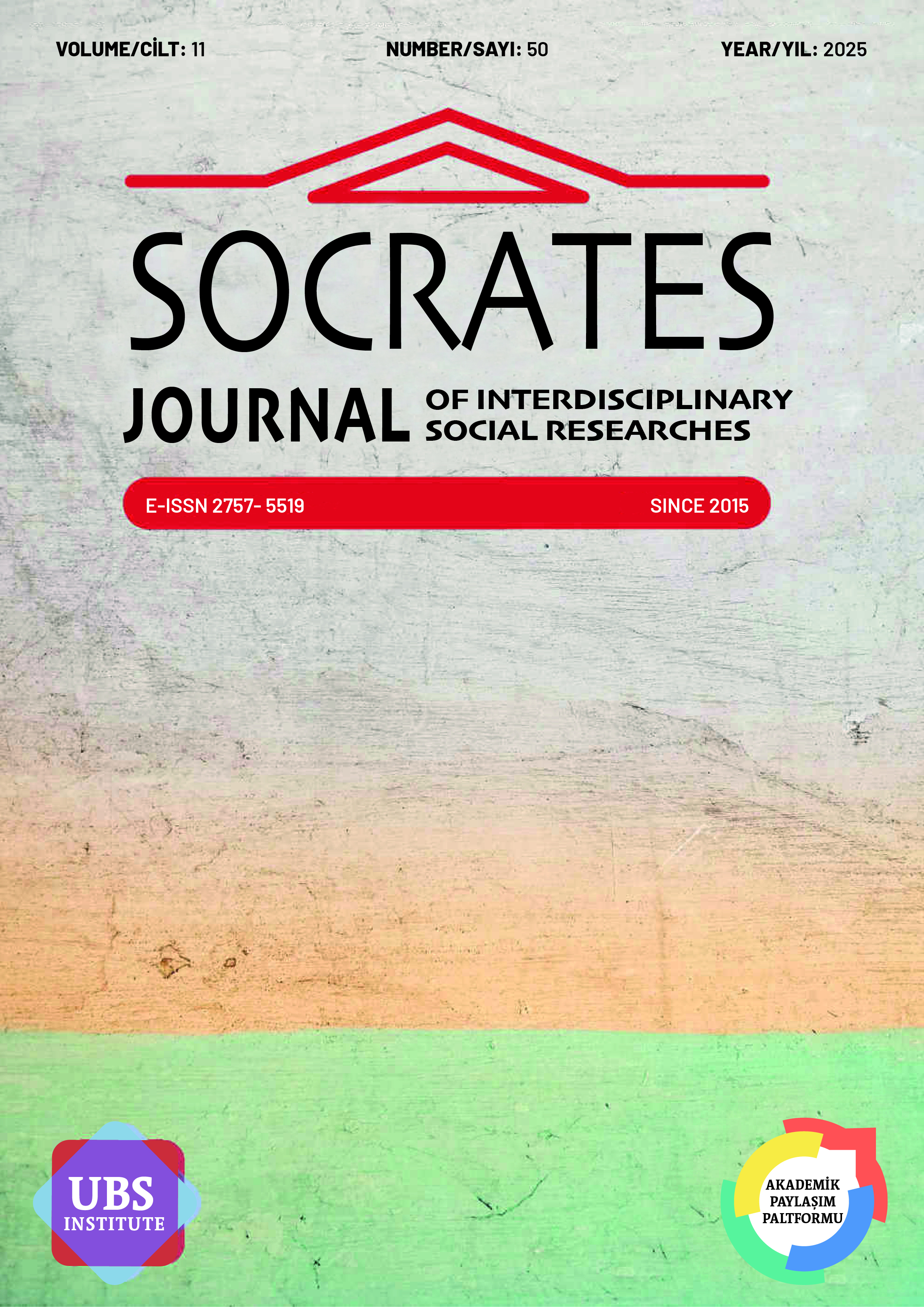LİMAN PAZARLAMA STRATEJİLERİNDE IOT TEKNOLOJİSİNİN AKILLI LİMAN VE TERMİNAL OPERASYONLARINA UYGULANMASIYLA HİZMET MARKA DEĞERİNİN ARTTIRILMASI
INCREASING SERVICE BRAND VALUE BY APPLYING IOT TECHNOLOGY TO SMART PORT AND TERMINAL OPERATIONS IN PORT MARKETING STRATEGIES
DOI:
https://doi.org/10.5281/zenodo.14845565Anahtar Kelimeler:
Liman Pazarlama, Staretji, IoT Teknolosi, Akıllı Liman, Terminal Operasyonları, Hizmet Marka DeğeriÖzet
Deniz ticaretinin temel unsurları arasında olmasının yanında deniz ticaret talebinin oluşturulmasında önemli bir yere sahip olan limanlar sahip oldukları işletmelerin pazarlama stratejilerinde Nesnelerin İnterneti (IoT) teknolojisinin rolü önemli bir yerdedir. Bu teknolojiyle limanın daha geniş ve kapsamlı biçimde yönetilmesiyle akıllı liman ve terminal operasyonlarına uygulanmasının hizmet marka değerini nasıl artırabileceğini ele almaktadır. IoT teknolojisinin liman operasyonlarında verimliliği artırma, maliyetleri düşürme ve müşteri memnuniyetini yükseltme konularındaki katkıları incelenmektedir. Araştırma, IoT’nin liman yönetiminde nasıl entegre edilebileceğini ve rekabet avantajı sağlayabileceğini ortaya koymayı amaçlamaktadır. Çalışma aynı zamanda liman pazarlama stratejilerinde IoT’nin kullanımını ve hizmet marka değerine olan etkilerini araştırmayı hedeflemektedir. Dijitalleşme ve otomasyonun işletmelerin hızlı ve verimli biçimde çalışarak sektörde yaygınlaşmasıyla birlikte liman operasyonları daha akıllı ve verimli hale gelmektedir. Fiziksel nesnelerin birebiriyle ya da daha büyük sistemlerle bağ kurabildiği IoT teknolojileri, büyüğünden küçüğüne kadar denizdeki tesislerin liman altyapısını daha iyi yönetmeyi, operasyonları gerçek zamanlı izlemeyi ve lojistik süreçleri optimize etmeyi mümkün kılmaktadır.
Referanslar
Bauk, S., Schmeink, A., Colomer, J. (2016). An RFID model for improving workers’ safety at the seaport in transitional environment. Transport, 33, 353-63. https://doi.org/10.3846/16484142.1233512.
Bayoumi, E., Elgazzar, S., Obrecht, M. (2020). Investigating the impact of Internet of Things on Egyptian ports sustainability. Proc. 8th Int. Conf. Adv. Mater. Syst., INCDTP - Leather and Footwear Research Institute (ICPI), Bucharest, Romania; 263-70. https://doi.org/10.24264/icams-2020.III.3.
Belfkih, A., Duvallet, C., Sadeg, B. (2017). The Internet of Things for smart ports: Application to the port of Le Havre. Proc. IPaSPort, Normandie University, Le Havre, France:, p. 3-4.
Bıyık, C. ve Yigitcanlar T. (2020). Intelligent transport systems in Turkish urban environments: a comprehensive review. Int J Knowledge-Based Dev, 11, 382. https://doi.org/10.1504/IJKBD.2020.10037852.
Bui, V.D., & Nguyen, H.P. (2022). Role of Inland Container Depot System in Developing the Sustainable Transport System. Int J Knowledge-Based Dev, 12, 1. https://doi.org/10.1504/IJKBD.2022.10053121.
Fabian, P., Gerlici, J., Masek, J., Marton, P. (2013). Versatile, Efficient and Long Wagon for Intermodal Transport in Europe. Commun - Sci Lett Univ Zilina, 15, 118-23. https://doi.org/10.26552/com.C.2013.2.118- 123.
Ghouse, S., Peerzade, M.N., & Patil, D.S. (2022). Analyzing the Alignments of Roads by Giving Weightages to Various Factors - a Case Study, 3, 1-10.
Hoang, A.T., Pham, V.V.A. (2018). review on fuels used for marine diesel engines. J Mech Eng Res Dev, 41, 22-32.
Hummels, D. (2007). Transportation Costs and International Trade in the Second Era of Globalization. J Econ Perspect, 21, 131-54. https://doi.org/10.1257/jep.2f3.131.
Jovic, M., Filipovic, M., Tijan, E., Jardas, M.A. (2019). Review of Blockchain Technology Implementation in Shipping Industry. Pomorstvo, 33, 140-8. https://doi.org/10.31217/p.33.2.3.
Kalajdzic, M., Vasilev, M., Momcilovic, N. (2022). Evaluating an Inland Waterway Cargo Vessel’s Energy Efficiency Indices. Polish Marit Res, 29, 27-34.
Kanifolskyi, O. (2022). General Strength, Energy Efficiency (EEDI), and Energy Wave Criterion (EWC) of Deadrise Hulls for Transitional Mode. Polish Marit Res, 29, 4-10.
Liang, M., Chen, M. (2022). Monitoring the Performance of a Ship’s Main Engine Based on Big Data Technology. Polish Marit Res, 29, 128-40.
Luong, T., Van, Thuan, P. Van, Giang, H.H., Nam, L.T. (2022). Evaluation Model the Risk of Collision Between Two Target Ships in Pollution Management Strategy in Coastal Waters. Int J Knowledge-Based Dev, 12, 1. https://doi.org/10.1504/IJKBD.2022.10052994.
Masek, J., Kolarovszki, P., Camaj, J. (2016). Application of RFID Technology in Railway Transport Services and Logistics Chains. Procedia Eng, 134, 231-6. https://doi.org/10.1016Zj.proeng.2016.01.064.
Nguyen, H.P., Hoang, A.T., Nizetic, S., Nguyen, X.P., Le A.T., Luong, C.N., et al. (2021). The electric propulsion system as a green solution for management strategy of CO2 emission in ocean shipping: A comprehensive review. Int Trans Electr Energy Syst, 31:e12580. https://doi.org/10.1002/2050-7038.12580.
Nguyen, H.P., Pham, N.D.K., Bui, V.D. (2022). Technical-Environmental Assessment of Energy Management Systems in Smart Ports. Int J Renew Energy Dev, 1, 889-901. https://doi.org/10.14710/ijred.2022.46300.
Pham, V.V., & Hoang, A.T. (2019). Technological Perspective for Reducing Emissions from Marine Engines. Int J Adv Sci Eng Inf Technol, 9, 1989. https://doi.org/10.18517/ijaseit.9.6.10429.
Phan, V.H., Dang, Q.V., Le T.D. (2022). Optimal Weather Routing Based on Adaptive Bacteria Foraging Lgorithm for Vessel. J Technol Innov, 2, 16-9. https://doi.org/10.26480/jtin.01.2022.16.19.
Philipp, R. (2020). Blockchain for LBG Maritime Energy Contracting and
Rey, A., Panetti, E., Maglio, R., & Ferretti, M. (2020). Determinants in adopting the Internet of Things in the transport and logistics industry. J Bus Res, 131, 584-90. https://doi.org/10.1016/jjbusres.2020.12.049
Tichavska, M., Cabrera, F., Tovar, B., & Arana V. (2015). Use of the Automatic Identification System in Academic Research. In: Moreno-Diaz R, Pichler F, Quesada-Arencibia A, editors. Comput. Aided Syst. Theory -EUROCAST 2015, Springer, 33-40. https://doi.org/10.1007/978-3-319-27340-2_5.
Yalama, V., Yakovleva, O., Trandafilov, V., & Khmelniuk, M. (2022). Future Sustainable Maritime Sector: Energy Efficiency Improvement and Environmental Impact Reduction for Fishing Carriers Older than 20 Years in the Fleet Part II. Polish Marit Res, 29, 78-88.
Yan, X., Song, H., Peng, Z., Kong, H., Cheng, Y., & Han L. (2021). Review of Research Results Concerning the Modelling of Shipping Noise. Polish Marit Res, 28, 102-15. https://doi.org/10.2478/pomr-2021-0027.
Zelazny, K. (2015). An Approximate Method for Calculation of Mean Statistical Value of Ship Service Speed on a Given Shipping Line, Useful in Preliminary Design Stage. Polish Marit Res, 22, 28-35. https://doi.org/10.1515/pomr-2015-0005.
Zienkiewicz, M.H., & Czaplewski, K. (2017). Application of Square M split Estimation in Determination of Vessel Position in Coastal Shipping. Polish Marit Res, 24, 3-12. https://doi.org/10.1515/pomr-2017-0044.
İndir
Yayınlanmış
Nasıl Atıf Yapılır
Sayı
Bölüm
Lisans
Telif Hakkı (c) 2025 Socrates Journal of Interdisciplinary Social Researches

Bu çalışma Creative Commons Attribution 4.0 International License ile lisanslanmıştır.


